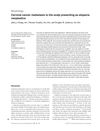 72 citations,
January 2003 in “American Journal of Pathology”
72 citations,
January 2003 in “American Journal of Pathology” A protein called CBP is found in prostate cancer and can increase the effectiveness of certain prostate cancer treatments.
 68 citations,
April 2014 in “Journal of Molecular Endocrinology”
68 citations,
April 2014 in “Journal of Molecular Endocrinology” The document concludes that targeting the androgen receptor may be a promising breast cancer treatment, especially for certain types.
 67 citations,
October 2005 in “Annals of Oncology”
67 citations,
October 2005 in “Annals of Oncology” Fulvestrant is a well-tolerated new treatment for advanced breast cancer that may delay chemotherapy.
 57 citations,
January 1986 in “The Prostate”
57 citations,
January 1986 in “The Prostate” The document suggests that targeting the hormone DHT could be a more effective treatment for prostate cancer than targeting testosterone.
56 citations,
September 2016 in “Pharmaceutical Research” The fish oil-based gel with imiquimod improves skin cancer treatment and reduces inflammation.
 56 citations,
February 2006 in “American journal of physiology. Cell physiology”
56 citations,
February 2006 in “American journal of physiology. Cell physiology” Steroid sex hormones activate matriptase in prostate cancer cells but not in breast cancer cells.
51 citations,
September 2008 in “Journal of Investigative Dermatology” Vitamin D receptor may help protect against UV-induced skin cancer.
50 citations,
April 2010 in “Biology direct” Low androgen levels might delay prostate cancer but could lead to more aggressive, therapy-resistant cancers.
 49 citations,
August 2009 in “British Journal of Cancer”
49 citations,
August 2009 in “British Journal of Cancer” Finasteride might lower the risk of low-grade prostate cancer but not high-grade cancer, while alpha-blockers might reduce high-grade cancer risk.
 44 citations,
October 2010 in “BJUI”
44 citations,
October 2010 in “BJUI” 5-α-reductase inhibitors reduce prostate cancer risk but may cause sexual dysfunction and don't affect high-grade tumor or death rates.
 38 citations,
February 2011 in “Annals of Oncology”
38 citations,
February 2011 in “Annals of Oncology” Men who experienced baldness at age 20 may have double the risk of getting prostate cancer.
 35 citations,
May 2008 in “Journal of Clinical Oncology”
35 citations,
May 2008 in “Journal of Clinical Oncology” A cancer patient died from a severe skin reaction after taking the drug cetuximab.
 34 citations,
November 2013 in “Breast Cancer Research and Treatment”
34 citations,
November 2013 in “Breast Cancer Research and Treatment” Aromatase inhibitor therapy for breast cancer increases the risk of hair loss and thinning.
 32 citations,
July 2017 in “Wiley Interdisciplinary Reviews-Developmental Biology”
32 citations,
July 2017 in “Wiley Interdisciplinary Reviews-Developmental Biology” Transit-amplifying cells are crucial for tissue repair and can contribute to cancer when they malfunction.
32 citations,
September 2013 in “Breast cancer research” A specific gene variant is linked to a higher risk of hair loss from chemotherapy in breast cancer patients.
 31 citations,
August 2020 in “EClinicalMedicine”
31 citations,
August 2020 in “EClinicalMedicine” Male cancer patients have a higher risk of severe illness and death from COVID-19 than female patients.
 30 citations,
January 2008 in “The Aging Male”
30 citations,
January 2008 in “The Aging Male” The study found no link between baldness patterns and androgen levels in men with benign prostate enlargement or prostate cancer.
 28 citations,
July 2017 in “Expert Review of Anticancer Therapy”
28 citations,
July 2017 in “Expert Review of Anticancer Therapy” Breast cancer patients taking CDK4/6 inhibitors are more likely to experience fatigue, hair loss, and mouth sores.
 28 citations,
June 2010 in “European Journal of Cancer”
28 citations,
June 2010 in “European Journal of Cancer” Baldness at age 40 is not linked to a higher risk of aggressive prostate cancer.
 28 citations,
January 2003 in “Urologic oncology”
28 citations,
January 2003 in “Urologic oncology” Suppressing certain hormones might help prevent prostate cancer.
 27 citations,
December 2014 in “Current problems in dermatology”
27 citations,
December 2014 in “Current problems in dermatology” Photodynamic therapy is the preferred treatment for skin precancer due to its effectiveness and safety.
 24 citations,
November 2013 in “British Journal of Dermatology”
24 citations,
November 2013 in “British Journal of Dermatology” Chemotherapy causes hair loss starting soon after treatment begins and recovers about 3 months after ending, while tamoxifen does not significantly affect hair growth.
 24 citations,
February 2007 in “International Journal of Dermatology”
24 citations,
February 2007 in “International Journal of Dermatology” A woman with cervical cancer had rare scalp metastasis causing a unique type of hair loss.
23 citations,
March 2017 in “JAAD case reports” The document suggests a possible link between FAM111B gene mutations and increased cancer risk, particularly pancreatic cancer.
 22 citations,
November 2018 in “Breast Cancer Research and Treatment”
22 citations,
November 2018 in “Breast Cancer Research and Treatment” The medications 5α-reductase inhibitors and spironolactone are generally safe for breast cancer patients on endocrine therapies and do not significantly increase breast cancer risk.
 22 citations,
November 2005 in “BMC Cancer”
22 citations,
November 2005 in “BMC Cancer” Gemcitabine and paclitaxel are effective and safe as first-line treatment for metastatic breast cancer.
 20 citations,
May 2018 in “The Journal of Urology”
20 citations,
May 2018 in “The Journal of Urology” Men taking 5-alpha-reductase inhibitors before or after bladder cancer diagnosis had a lower risk of dying from the disease.
 20 citations,
August 2016 in “International Journal of Cancer”
20 citations,
August 2016 in “International Journal of Cancer” Men with male pattern baldness have a higher risk of certain skin cancers, especially on the scalp.
 19 citations,
June 2018 in “Breast Cancer Research and Treatment”
19 citations,
June 2018 in “Breast Cancer Research and Treatment” Scalp cooling effectively prevents severe hair loss in breast cancer patients treated with docetaxel and is safe.
19 citations,
October 2016 in “Journal of oncology pharmacy practice” A cancer patient's hair became permanently curly after treatment with nivolumab.























